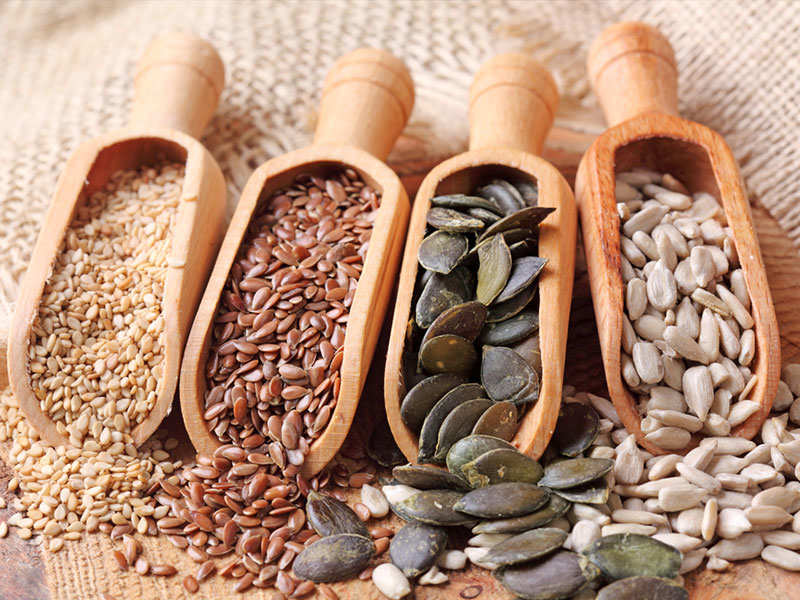What Is The Significance Of Seeds?
Seeds are nutrient-dense and provide numerous health advantages. These little yet powerful kernels are abundant in vitamins and minerals that the body requires to function at its best. Seeds are incredibly adaptable and can be easily included into a wide range of dishes. Do you require additional energy? Do you want to have a thinner waist? There’s a seed in there somewhere!

Chia Seeds
Chia has come a long way since it first appeared in TV commercials as comical pottery. A 2-tablespoon serving of these small seeds has 10 grammes of fibre. Proteins, omega-3 fatty acids, antioxidants, and minerals like iron, calcium, magnesium, and zinc are also present. Chia seeds are simple to incorporate into your favourite recipes. Sprinkle them on cereal, veggies, or yoghurt, ground or whole. You can easily buy chia seeds online in India and soak them in water and add them to cooked cereal, or look for a chia pudding recipe for a nutritious and delicious dessert.
Wild rice is a grass seed, not a grain.
Rice with a Twist
Wild rice is a grass seed, not a grain. It has 30 times more antioxidants than white rice and has more protein than most other whole grains. Wild rice is high in fibre and nutrients like folate, magnesium, phosphorus, manganese, zinc, vitamin B6, and niacin, among others.
Seeds from pumpkins
In just 14 cup of pumpkin seeds, you can get 16 percent of your daily iron needs. You’ll get 5 grammes of fibre from that same 14 cup, which is more than most nuts. Pumpkin seeds are also high in amino acids, protein, and omega-3 fatty acids, as well as minerals like zinc and magnesium. Fresh roasted pumpkin seeds are a great snack for Halloween, but they’re also great sprinkled on oatmeal, baked into muffins, blended into smoothies, or added to homemade granola and energy bars all year.
Seeds of Pomegranate
Arils are little crimson “jewels” found in pomegranate seeds. These arils are high in fibre and provide 40% of your daily vitamin C needs. Polyphenols, which include flavonoids, tannins, and anthocyanins, are heart-healthy antioxidants.
Pomegranate seeds are a low-calorie, sweet and juicy snack. Toss them in salads, blend them with yoghurt, or make jelly with them.
Quinoa
Quinoa contains a surprising amount of protein (15 percent, or 8 grammes per cup), as well as amino acids and vitamin E. It also contains quercetin, an antioxidant. This nutty-flavored seed can be used in place of rice or pasta in grain meals. Quinoa is also a gluten-free breading that may be used in place of oatmeal for breakfast.
Flax Seeds
Flaxseed is a nutrient-dense food. Flaxseed includes 6 grammes of fibre and 4 grammes of protein in only two tablespoons. It also has a lot of alpha-linolenic acid, which is an omega-3 fatty acid. According to certain research, flaxseed eating improves cardiovascular health. Flaxseed also includes lignans, which may aid in cancer prevention. You can also buy roasted flax seeds online.
Hemp Seeds
Hemp seeds are high in omega-3 and omega-6 fatty acids, which are good for your heart. In just 2 tablespoons, they provide 10 grammes of readily digestible protein. The flavour of hemp seeds is moderate and nutty. They’re delicious on their own, in salads, and on top of yoghurt. Hemp milk is a great substitute for dairy milk.
Seeds of Sunflower
Raw Sunflower seeds are strong in protein, fibre, phytochemicals, selenium, copper, and magnesium, as well as beneficial fats. Sunflower seeds are “the highest source of vitamin E,” according to the USDA. Sunflower seeds can be used in muffins or bread recipes, vegetable dishes or stir-fries, trail mixes, cereals, and yoghurt, in addition to salad toppings. Crushed sunflower seeds make a wonderful gluten-free fish or chicken coating.
Seeds of Sesame
Sesame seeds, despite their small size, contain up to 20% protein and a lot of fibre. They’re high in tryptophan and methionine, two essential amino acids. Because it is high in linoleic and oleic acids, which decrease cholesterol, sesame oil is a good choice for salad dressings. Tahini (ground sesame seeds) is a key component in hummus and can also be used as a nut-free alternative for those who are allergic to nuts. To add crunch to salads or stir-fry foods, sprinkle sesame seeds on top.
Nuts de Pino
Pine nuts are high in vitamin A, thiamin, riboflavin, niacin, and vitamin E, as well as copper, iron, manganese, and phosphorus. They’re also high in linoleic acid, a fatty acid that works as an appetite suppressor naturally. Pine nuts include monosaturated fats, which are known to lower cholesterol levels in the bloodstream, lowering the risk of heart attack and stroke. You can use them in salads, yoghurts, trail mixes, muffins, and veggie meals, just like the rest of the seeds.
Seeds of the poppy
One teaspoon of small poppy seeds can provide up to 4% of your necessary daily phosphorous, calcium, and iron intake. Calcium and phosphorus are two vital elements for strong bones. Poppy seeds are high in oleic acid, fibre, and omega-3 fatty acids, among other nutrients. Salad dressings, whole wheat pancakes, muffins, and veggie meals are all simple to incorporate poppy seeds into. Simply sprinkle them on top!


